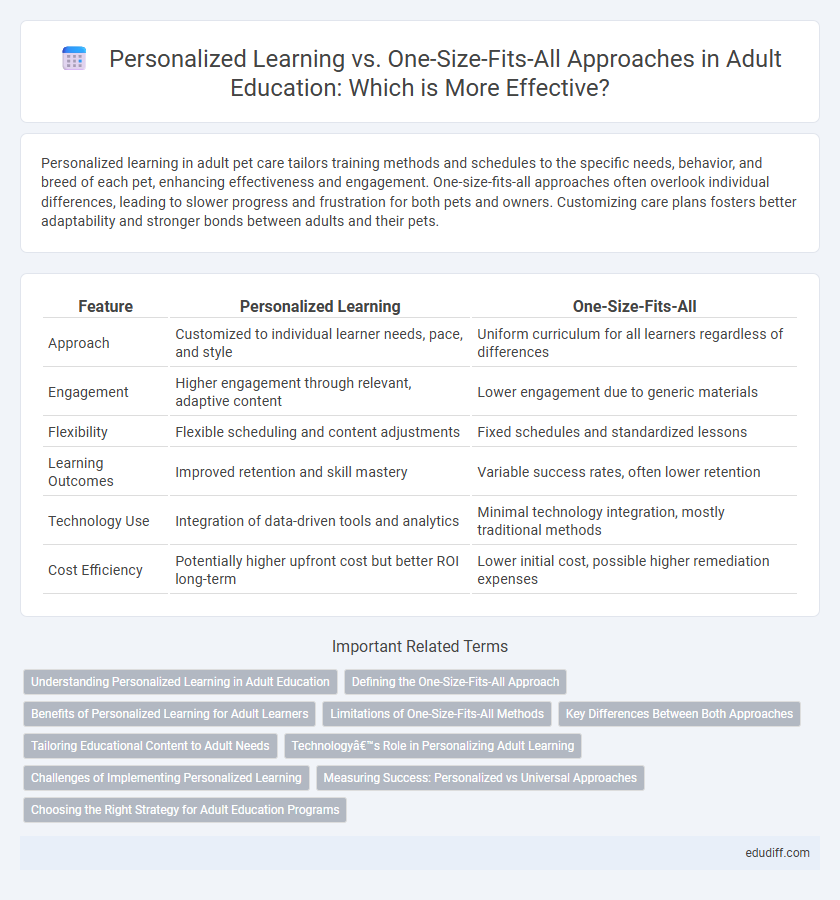Personalized learning in adult pet care tailors training methods and schedules to the specific needs, behavior, and breed of each pet, enhancing effectiveness and engagement. One-size-fits-all approaches often overlook individual differences, leading to slower progress and frustration for both pets and owners. Customizing care plans fosters better adaptability and stronger bonds between adults and their pets.
Table of Comparison
| Feature | Personalized Learning | One-Size-Fits-All |
|---|---|---|
| Approach | Customized to individual learner needs, pace, and style | Uniform curriculum for all learners regardless of differences |
| Engagement | Higher engagement through relevant, adaptive content | Lower engagement due to generic materials |
| Flexibility | Flexible scheduling and content adjustments | Fixed schedules and standardized lessons |
| Learning Outcomes | Improved retention and skill mastery | Variable success rates, often lower retention |
| Technology Use | Integration of data-driven tools and analytics | Minimal technology integration, mostly traditional methods |
| Cost Efficiency | Potentially higher upfront cost but better ROI long-term | Lower initial cost, possible higher remediation expenses |
Understanding Personalized Learning in Adult Education
Personalized learning in adult education tailors instructional methods, pacing, and content to individual learners' needs, interests, and goals, enhancing engagement and retention. Unlike one-size-fits-all approaches that deliver uniform curricula, personalized learning leverages adaptive technologies and competency-based assessments to address diverse skill levels and backgrounds. This learner-centered model supports self-directed learning and real-world application, crucial for adult learners balancing education with personal and professional commitments.
Defining the One-Size-Fits-All Approach
The one-size-fits-all approach in adult education applies uniform teaching methods and materials to all learners regardless of their unique backgrounds, skills, or learning preferences. This model often leads to reduced engagement and limited skill acquisition as it fails to address individual needs and paces. Its standardized nature contrasts sharply with personalized learning, which adapts content, delivery, and assessments to optimize adult learner outcomes.
Benefits of Personalized Learning for Adult Learners
Personalized learning for adult learners enhances engagement by tailoring content to individual goals, prior experience, and learning pace. This approach boosts retention and practical application of knowledge, as adults receive relevant, context-specific materials that address their unique professional and personal needs. Personalized learning fosters greater motivation and self-directed growth, essential for effective continuing education in diverse adult populations.
Limitations of One-Size-Fits-All Methods
One-size-fits-all learning methods often fail to address the diverse needs, pace, and learning styles of adult learners, leading to disengagement and suboptimal outcomes. These generic approaches overlook individual strengths and weaknesses, making it difficult to accommodate varying levels of prior knowledge and motivation. Personalized learning offers tailored experiences that can adapt content, assessment, and support to maximize adult learners' potential and improve retention.
Key Differences Between Both Approaches
Personalized learning tailors educational experiences to individual adult learners' needs, preferences, and pace, enhancing engagement and retention. One-size-fits-all approaches apply uniform content and teaching methods, often leading to disengagement due to lack of relevance. Data shows personalized learning improves skill acquisition rates by up to 30% compared to traditional models.
Tailoring Educational Content to Adult Needs
Personalized learning approaches adapt educational content to meet the unique life experiences, learning paces, and professional goals of adult learners, enhancing engagement and knowledge retention. One-size-fits-all models often overlook diverse backgrounds and skills, resulting in reduced relevance and motivation among adults. Tailoring coursework using adaptive technology and real-world scenarios significantly improves skill acquisition and practical application for adult education programs.
Technology’s Role in Personalizing Adult Learning
Technology transforms adult education by enabling personalized learning pathways tailored to individual skills, goals, and learning speeds. Adaptive learning platforms analyze real-time data to modify content delivery, enhancing engagement and retention compared to one-size-fits-all models. Mobile apps, AI-driven assessments, and virtual mentors empower adults to access flexible, relevant training that aligns with their professional development needs.
Challenges of Implementing Personalized Learning
Implementing personalized learning in adult education faces significant challenges such as the need for advanced technology infrastructure and sufficient training for instructors to tailor content effectively. Diverse learner backgrounds and varying skill levels demand customized approaches, increasing complexity and resource requirements compared to one-size-fits-all models. Financial constraints and scalability issues often hinder the widespread adoption of personalized learning solutions in adult education settings.
Measuring Success: Personalized vs Universal Approaches
Personalized learning measures success through individual progress tracking, tailored assessments, and adaptive feedback, ensuring learners meet specific goals aligned with their abilities. In contrast, one-size-fits-all approaches rely on standardized tests and uniform benchmarks that may not accurately reflect diverse learner outcomes. Data indicates personalized methods improve engagement and retention by addressing unique learning needs, while universal metrics often overlook individual growth nuances.
Choosing the Right Strategy for Adult Education Programs
Personalized learning in adult education tailors content to individual learners' needs, enhancing engagement and retention by addressing specific skill levels and career goals. One-size-fits-all approaches, while easier to implement, often overlook diverse learning styles and experiences common among adult learners, potentially leading to lower motivation. Selecting the right strategy requires assessing learner profiles and program objectives to create flexible pathways that support effective skill development and lifelong learning outcomes.
Personalized learning vs One-size-fits-all Infographic

 edudiff.com
edudiff.com